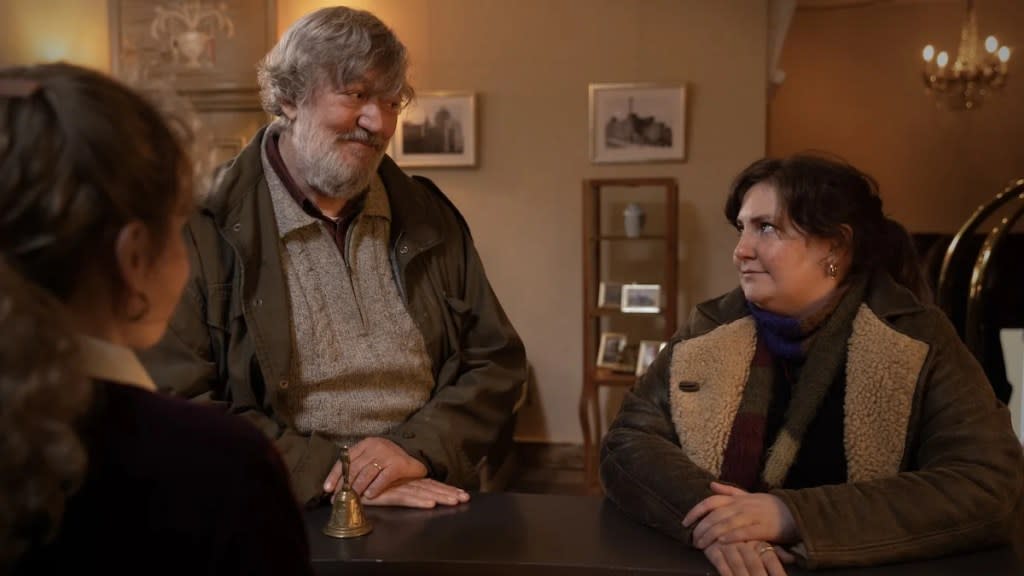‘Treasure’ Review: Lena Dunham Faces Holocaust Trauma Through a Feel-Good Father-Daughter Road Movie

- Oops!Something went wrong.Please try again later.
- Oops!Something went wrong.Please try again later.
To call Julia von Heinz’ “Treasure” both sympathetic and broadly appealing might well be damning the film with faint praise, but circumstances here force our hand. How else to describe a heartwarming father-daughter road movie that takes as its subject the multi-generational, multi-national trauma of the Holocaust?
What else can one say about a warmly acted, unobtrusively directed peer into Auschwitz that feels most comfortable as a feel-good tearjerker? So if there’s nothing particularly objectionable about the family tale that premiered on Saturday at the Berlin Film Festival, little about it really lingers.
Little, that is, except the premise. Based on a partially autobiographical novel by author Lily Brett, “Treasure” follows a pair of Jewish Americans as they travel through Poland, returning to and reflecting on the site of their own family’s destruction. Given the Shoah’s catastrophic toll, the number of families that have made similar returns is no doubt substantial; given the psychic scars such a journey can barely hope to heal, many returnees have subsequently channeled their experiences into art.
In other words, what separates this “Treasure” from literary gems like Jonathan Safran Foer’s “Everything Is Illuminated” and Jesse Eisenberg’s recent Sundance breakout “A Real Pain” (just to name a few) falls squarely on the shoulders of agreeable leads Lena Dunham and Stephen Fry. Here too, we find ourselves damning with faint praise, especially given the fraught if unmet potential of this particular film’s setting.
The year is 1991, the Iron Curtain has been lifted, and 36-year-old journalist Ruth Rothwax (Lena Dunham) finds herself among the vanguard of Jews able to partake in what would later be called “Holocaust tourism.” A first-generation American no less inoculated from her parents’ firsthand trauma, Ruth would bristle at the term — and she does, especially when she learns of a refreshment stand newly opened on the Auschwitz site.
“It’s not a museum,” she protests. “It’s a death camp!”
Point well taken, though her Polish-born father Edek (Stephen Fry) simply calls it “my old home.” Recently widowed, though still wearing his wedding ring and hardly adverse to the odd one-night stand, the rakish old charmer invited himself on his daughter’s excursion. He returns to his country of birth less out of a pressing desire to dredge up old wounds than to simply spend some time with his recently divorced only child.
What emerges is a finely wrought character drama, a self-described “special father-daughter trip” following a gregarious raconteur and his tightly wound child as they come to understand one another on equal terms. It plays as the kind of roundabout, English-language “Toni Erdmann” Lena Dunham was once slated to direct. What remains frustratingly opaque is any attempt to explore or contextualize this discrete post-Soviet moment in time.
Otherwise that might not be a problem, but for the film’s intention to anchor the conflict within a highly specific divide. Unlike those similar, aforementioned titles, “Treasure” pulls at the impossible understanding between a generation of survivors and the children they reared – kin separated by incompatible visions and experiences of the world, casting orphans against progeny raised in quiet grief while spared from similar heartbreak. Only that divide is irrevocably etched in the 20th century and all that it entails.
That so much of the film coasts by on Dunham and Fry’s unique screen personas also throws the oddly intemporal dissonance into starker relief. While the wry and affable Fry has little trouble stepping into the shoes of a jovial sort holding in a torrent of sadness – all while chewing on a thick Polish accent for extra good fun – Dunham’s more clearly defined presence doesn’t always scan for a character born of a much different era. When Ruth describes herself as “not a girl – more like a rapidly aging woman” with the precise inflection that made Dunham at least a voice of a generation, one can hear any number of her iconic characters, but not necessarily their parents.
If such dissonance doesn’t dull the familiar, bickering chemistry both leads share with one another, it does limit the film’s impact. The self-contained “Treasure” ambles along on the strength of a fine, self-contained script and two winning performers, without ever reflecting or commenting on the historical weight it sets out to explore.
The post ‘Treasure’ Review: Lena Dunham Faces Holocaust Trauma Through a Feel-Good Father-Daughter Road Movie appeared first on TheWrap.

